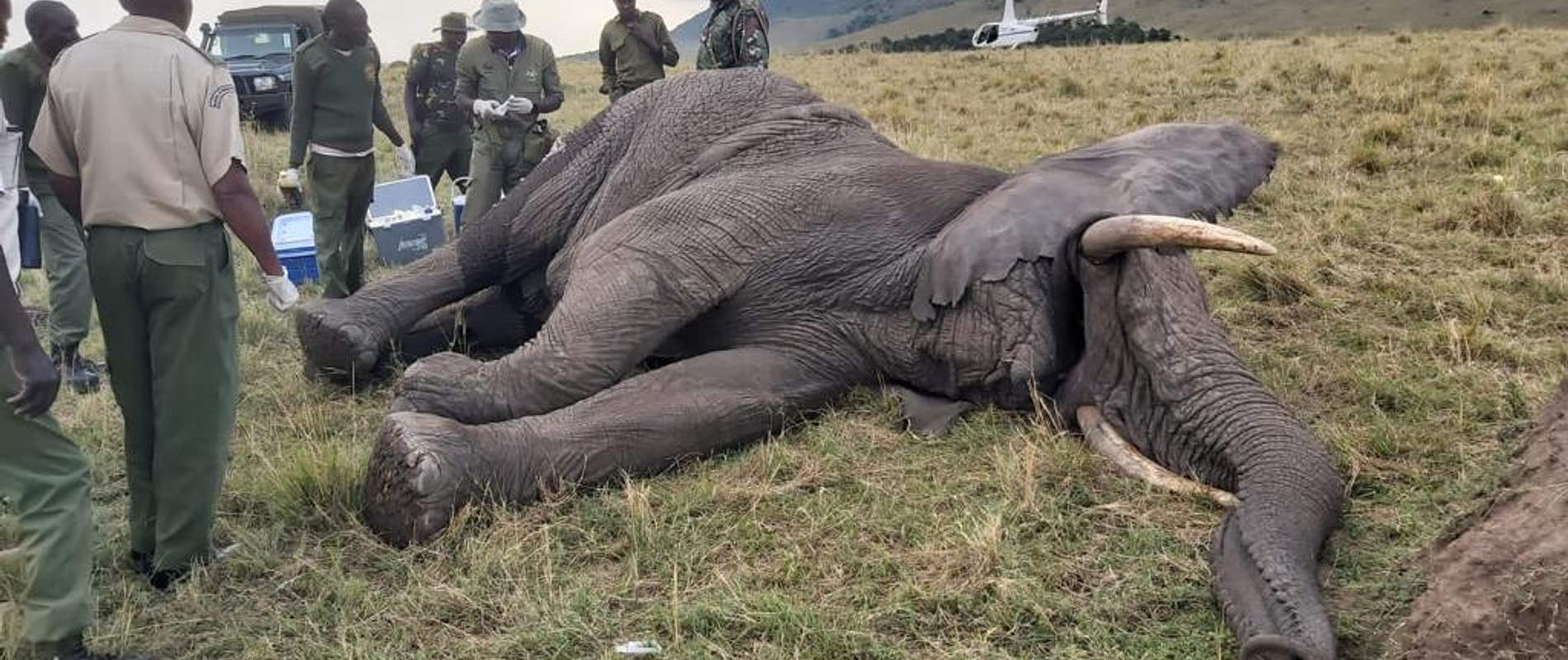Yesterday, two life-saving operations unfolded within the Mara. It started with a young calf who had a snare slicing cruelly across his face; it ended with an enormous bull who had likely been speared.

The first patient, a young calf with a grisly snare injury
On 18th December, we received two reports from the Mara. Time was of the essence, so we mobilised Sky Vets, our initiative designed to rapidly treat wildlife in time-sensitive situations or inaccessible areas. Dr Poghon, an experienced KWS veterinarian who has worked extensively with our Mobile Vet Units, was mobilised from Nairobi. After a short flight down to the Mara, he and his team were ready for action.

The snare had wrapped around the calf's head
First up was the calf. Everyone was taken aback by the terrible injury he was grappling with. A wire snare had become wrapped inside his mouth, slicing around his jaw and behind his ear. While it had not yet caused mortal injuries, it was only a matter of time before it completely impeded his ability to eat. He must have been in unimaginable agony.

After darting mum and baby, treatment could commence
Treating a milk-dependent calf brings an added layer of complexity, because we usually have to anaesthetise the patient’s mother, too. Such was the case with this operation. First, Dr Poghon darted mum, who went down without incident.

The first step was to cut away the wire snare
The calf was another matter entirely. The moment his mum left his side, he was absorbed by the rest of the herd. This was a poignant display of the love and loyalty of elephants — but it turned darting him into a significant challenge. Fortunately, Dr Poghon has vast experience in the field and was able to land the anaesthetic.

Then, the team set about treating the wound left behind
The team removed the wire snare and tended to the wound, which made a grisly circle around his head. Left untreated, it would have had lethal implications. Thanks to speedy intervention, however, Dr Poghon is optimistic that this little chap will make a full recovery.

Thanks to timely intervention, the baby is expected to make a complete recovery
The calf had fallen about 250 metres away from his mum. The team put him in a field vehicle and drove him over to her side, so they could wake up together. The calf got to his feet first and set about prodding his mum. She awoke shortly thereafter and hugged her beloved baby to her side. Together, they walked off to reunite with their herd.

The team's second treatment was a significantly larger affair
After their tiny first patient, the team moved on to a supersized second act. Their next patient was a statuesque bull who was near the tip of the Mara Triangle. Accompanied by rangers and personnel from the Mara Conservancy and Anne K. Taylor Fund, the team walked a great distance into the forested valley in order to reach the patient.

This bull had two penetrating wounds, likely caused by a spear
It was getting late, but fortunately, the treatment went forth without a hitch. The bull had two penetrating wounds, one on his left front limb and another on his right rump. Based on their appearance, they were likely inflicted by spears. The team cleaned out both wounds and administered medications to expedite healing. Dr Poghon is confident that he will make a complete recovery. The bull was soon back on his feet and off to find his friends.

Fortunately, he too is expected to make a complete recovery
Our six Mobile Vet Units and Sky Vets were formed to save all manner of creatures and keep wild families together. These treatments are two tangible examples of that mission at work. We are incredibly grateful to our supporters, who make these life-saving operations possible. We would also like to thank our friends in the Mara, Mara Conservancy, Mara Elephant Project, and Anne K. Taylor Fund, for helping us give this baby and bull a second chance.
Special thanks to Alfred Bett, Warden of Mara Triangle, for the photographs of these treatments.
